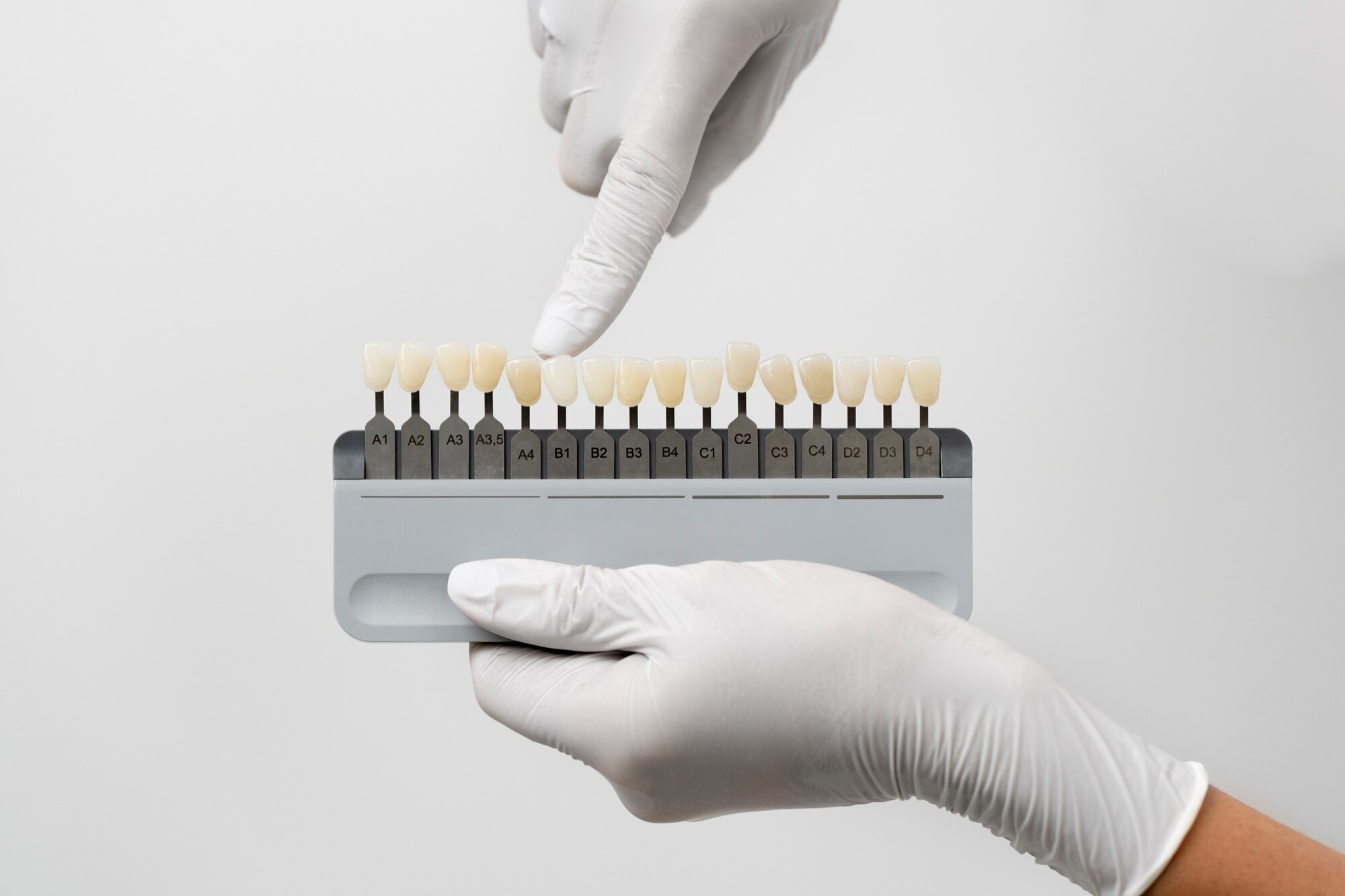What are Dental Veneers?
Dental veneers are thin, custom-made shells of tooth-colored materials that are designed to cover the front surface of teeth. They are used to improve the appearance of teeth by altering their color, shape, size, or length. Veneers are bonded to the front of the teeth, providing a natural and aesthetically pleasing appearance.


What materials are used in dental veneers?
- Porcelain Veneers: Durable, stain-resistant ceramic veneers that mimic the look of natural teeth.
- Composite Resin Veneers: Less expensive, but less durable and stain-resistant compared to porcelain veneers.
- E-max Laminate Veneers (Lithium Disilicate): High-strength ceramic veneers offering superior durability and aesthetics.
When should I get dental veneers?
You should consider dental veneers if you want to address the following dental issues:
- Discolored or stained teeth that don’t respond to whitening treatments.
- Worn down, chipped, or broken teeth.
- Misaligned, uneven, or irregularly shaped teeth.
- Gaps between teeth that you want to close.
- Teeth that are too small or misshapen and affect the aesthetic balance of your smile.
What are the benefits of dental veneers?
- Aesthetic enhancement: Improves the appearance of teeth for a uniform, whiter smile.
- Natural appearance: Mimics natural teeth in both color and texture.
- Durable and stain-resistant: Porcelain and E-max veneers resist stains better than natural enamel.
- Conservative treatment: Requires less removal of natural tooth structure compared to crowns.
- Long-lasting: With proper care, veneers can last 10–15 years or longer.
What are the risks of dental veneers?
- Irreversibility: Enamel removal makes the process permanent.
- Potential for damage: Veneers can chip or crack with excessive force.
- Increased tooth sensitivity: Some sensitivity to hot and cold may occur after enamel removal.
- Not suitable for everyone: Patients with severe misalignment or gum disease may not be ideal candidates.
- Replacement over time: Veneers may wear down and need replacement over time.
How does the procedure work?
- Consultation: Dentist evaluates teeth, discusses goals, and determines if veneers are suitable.
- Preparation: Enamel is removed, impressions are taken, and temporary veneers are placed.
- Fabrication: Veneers are custom-made at a dental lab, typically taking 1–2 weeks.
- Bonding: Veneers are bonded to teeth using a special adhesive and curing light.
- Final Adjustments: Dentist ensures veneers fit comfortably and look natural.
How Long Do Dental Veneers Last?
With proper care, dental veneers can last 10 to 15 years or longer. Factors influencing their longevity include:
- Material Type: Porcelain and E-max veneers are more durable than composite resin.
- Oral Hygiene: Regular brushing, flossing, and professional cleanings extend their lifespan.
- Lifestyle Choices: Avoiding habits like teeth grinding or chewing hard objects helps maintain veneers.
Do Dental Veneers Look Natural?
Yes, dental veneers are custom-designed to match the color, shape, and size of your natural teeth. Dentists use advanced techniques and high-quality materials to ensure veneers blend seamlessly with your smile.
Are Dental Veneers Permanent?
Yes, the procedure is considered permanent due to the removal of enamel. Once veneers are placed, the natural teeth will always need to be covered or restored.
How Do I Care for Dental Veneers?
- Daily Oral Hygiene: Brush twice a day and floss to keep veneers and surrounding teeth clean.
- Avoid Staining Foods and Drinks: Limit coffee, tea, and red wine to maintain the veneer’s appearance.
- Regular Dental Visits: Routine check-ups ensure the veneers and gums stay healthy.
- Use a Mouthguard: Protect veneers from grinding or impact during sports or sleep.
Are Dental Veneers Painful?
The procedure is usually painless as local anesthesia is used during enamel removal. Some patients may experience temporary sensitivity to hot and cold after the procedure.
Can Dental Veneers Stain or Discolor Over Time?
Porcelain and E-max veneers are highly stain-resistant, but composite resin veneers may stain more easily. Maintaining good oral hygiene and avoiding staining substances can help prevent discoloration.
Are There Alternatives to Dental Veneers?
- Dental Bonding: A more cost-effective solution for minor chips or discoloration.
- Teeth Whitening: Ideal for addressing stains without altering tooth structure.
- Crowns: Better suited for teeth with extensive damage or decay.
What Should I Expect During Recovery After Getting Veneers?
- Minor Sensitivity: Some sensitivity to hot and cold may occur for a few days.
- Immediate Results: You can enjoy a transformed smile right after the procedure.
- Normal Eating and Speaking: Once bonded, veneers function like natural teeth.
Can Dental Veneers Fix Gaps or Misaligned Teeth?
Yes, veneers can close small gaps and improve the appearance of minor misalignments, providing a straighter and more uniform smile.
Who is a Good Candidate for Dental Veneers?
- Healthy Gums and Teeth: Ideal candidates have no active dental issues.
- Minor Cosmetic Issues: Suitable for discoloration, small gaps, or slightly misaligned teeth.
- Nightguard Usage: Recommended for those with a history of teeth grinding or clenching.
Do I Need to Replace My Veneers Eventually?
Yes, veneers may need replacement after 10–15 years, depending on wear and tear. Signs that replacement is necessary include:
- Chips or Cracks: Veneers may need replacement if damaged.
- Gaps Between Veneer and Gumline: Replacement may be required over time.
- Discoloration or Dullness: Indicates the veneer is aging and may need replacement.